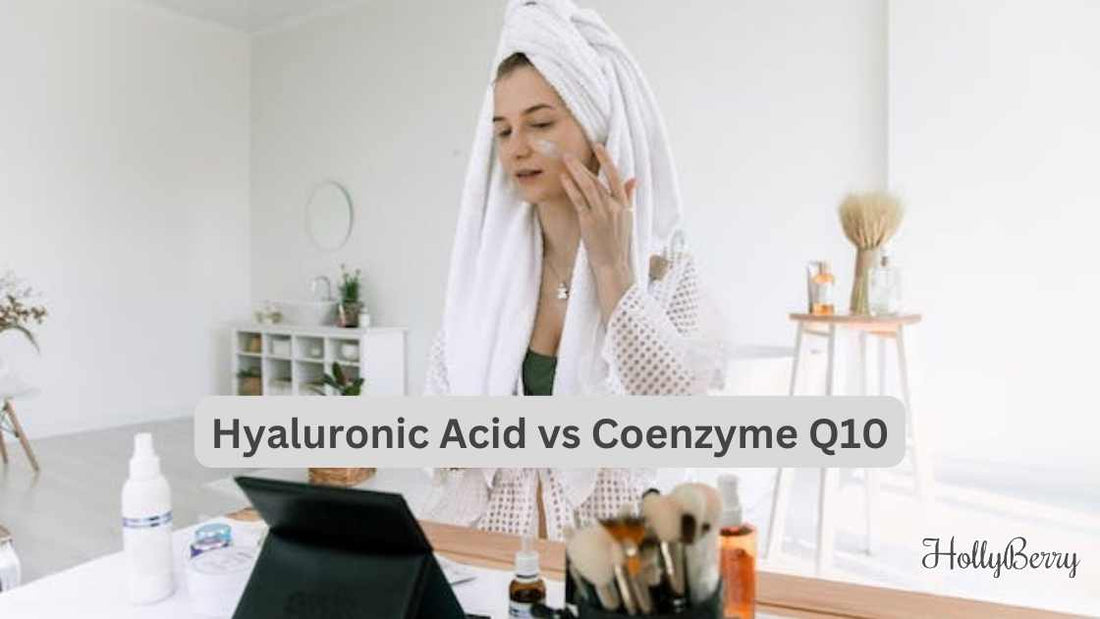
Hyaluronic Acid vs Coenzyme Q10
Share
Evaluating Skin Care Efficacies

Hyaluronic acid and coenzyme Q10 (CoQ10) have emerged as prominent ingredients in the world of skincare, each offering distinct benefits. Hyaluronic acid is widely known for its exceptional ability to retain moisture, making it a crucial component in keeping the skin hydrated and plump.
Its capacity to hold up to 1,000 times its weight in water exemplifies its efficacy in maintaining skin hydration, which is essential for a youthful and dewy complexion.
On the other hand, CoQ10 is a naturally occurring antioxidant in the human body, playing a pivotal role in energy production within cells, including skin cells.
As skin ages, the levels of CoQ10 decrease, potentially leading to a diminished ability to produce collagen and elastin, which are vital for skin elasticity and firmness.
Thus, CoQ10's antioxidant properties are significant in combatting oxidative stress, which can accelerate ageing and degrade the skin's overall health.
Whilst both ingredients are beneficial, they serve different purposes in skincare routines. Hyaluronic acid's primary role is to hydrate, making it suitable for almost all skin types, whereas CoQ10 focuses on energising and protecting the skin.
However, it's important to note that those with certain skin conditions should consult a dermatologist before incorporating CoQ10 into their regimen. Combining these ingredients can offer a comprehensive approach to skincare, targeting dehydration, ageing, and oxidative damage to support a radiant and resilient complexion.
Comparative Analysis of Hyaluronic Acid and Coenzyme Q10
In clinical skincare, hyaluronic acid and coenzyme Q10 are both renowned for their distinct but pivotal roles. This segment explores their chemical properties and their specific impact on skin ageing and wrinkle reduction.
Chemical Properties and Role in Skincare
Hyaluronic Acid (HA) is a glycosaminoglycan that plays a crucial role in the skin's hydration and tissue repair processes. As an ingredient in serums and moisturisers, it has the remarkable ability to retain moisture, plump the skin, and promote the synthesis of collagen and elastin, maintaining skin elasticity.
- Moisturising efficiency: Can hold up to 1,000 times its weight in water.
- Presence in skincare: Commonly found in serums, eye creams, and injectable fillers.
Coenzyme Q10 (CoQ10) is a fat-soluble antioxidant that is naturally produced by the body but diminishes with age. In skincare formulas, CoQ10 aids in protecting the skin against free radicals, supporting the production of collagen and improving the appearance of fine lines.
- Antioxidant properties: Neutralises free radicals; reduces oxidative damage.
- Skincare occurrence: Integrated into anti-ageing creams and serums.
Effects on Skin Ageing and Wrinkles
Both hyaluronic acid and coenzyme Q10 combat visible signs of ageing, but they address this common skin concern in different ways.
Hyaluronic Acid:
- Hydration: Elevates skin moisture levels, resulting in a smoother skin surface and reduced appearance of fine lines and wrinkles.
- Tissue Regeneration: Facilitates quicker cell turnover for a more youthful and revitalised complexion.
Coenzyme Q10:
- Cellular Defence: Shields skin cells from environmental stressors that expedite ageing.
- Wrinkle Reduction: Continuous use has been associated with a decrease in the depth of wrinkles, specifically by aiding mitochondrial function within the skin cells.
Utilising serums and formulas containing these ingredients helps in maintaining skin health, diminishes the signs of ageing, and promotes a youthful appearance. Each plays a unique role, yet both are essential for a comprehensive skincare regimen that targets hydration, protection, and anti-ageing effects.
Incorporating Into Skincare Routines
Choosing the right skincare products is crucial for maintaining a healthy complexion. Integrating hyaluronic acid and coenzyme Q10 into a skincare routine requires understanding their benefits and how they can cater to different skin types and synergise with other ingredients.
Recommended Usage for Different Skin Types
Hyaluronic Acid:
- All Skin Types: Being a humectant, hyaluronic acid is suitable for all skin types due to its hydrating properties. It helps to replenish the skin's moisture, particularly beneficial for dry skin.
- Sensitive Skin: For individuals with sensitive skin, hyaluronic acid can strengthen the skin barrier without causing irritation.
Coenzyme Q10:
- Sun-Damaged or Mature Skin: CoQ10 serums are recommended to help combat signs of ageing, such as fine lines caused by sun damage or pollution.
- Dry to Normal Skin Types: Those with dry to normal skin may find creams with coenzyme Q10 helpful to improve skin texture and brighten the complexion.
Synergistic Ingredients and Products
When pairing hyaluronic acid and coenzyme Q10 with other skincare ingredients, it's essential to understand their interactions:
-
Vitamin C: Works well with both hyaluronic acid and Q10 to brighten and even out skin tone.
- Skincare Products: Order our Hollyberry Cosmetics Hyaluronic acid serum here .
-
Peptides and Retinol: Using peptides alongside these ingredients can support skin elasticity, whereas retinol should be used with caution to prevent irritation.
- Application Tips: Apply a hyaluronic acid serum before using retinol to mitigate potential dryness.
- Sunscreen: Always include sunscreen in the morning routine when using products like retinol that may increase skin sensitivity to the sun.
In terms of formulations, look for:
- Serums: These usually have a higher concentration of active ingredients like CoQ10 for targeted treatment.
-
Creams: These can be used to lock in the moisture provided by hyaluronic acid.
- Price Consideration: Affordable options are available from brands like The Ordinary, while the price might be higher for formulations with advanced delivery systems or additional active ingredients.
In summary, when integrating hyaluronic acid or coenzyme Q10 into a skincare routine, consider the skin type for optimal application and align with synergistic ingredients for enhanced results.

